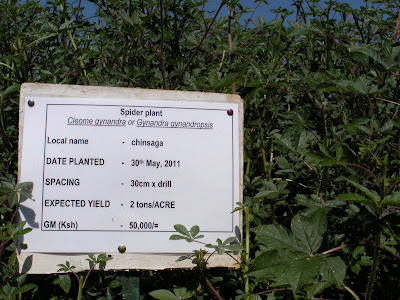It is common among farmers practice to buy seedlings for
planting in their farms. Seed planting is common for plants like maize and
beans.
For fruits and vegetables like kales, tomatoes and pawpaw,
farmers can learn a few tips on nursery preparation and care avoid unnecessary
expenditure in purchase of seedlings.
 |
| A section of land marked for nursery preparation |
A nursery can be as long as you choose but its width should
not exceed one meter. This is to facilitate ease of moving during weed removal
and watering your seedlings once they sprout.
Ensure the soil is soft to facilitate easy root development
and weeding when weeds strike.
 |
| A cross-section of a tree nursery |
Your nursery should be in a cool place or you can prepare a
shade for your sprouting seedlings as direct sunlight is likely to wither them.
The shade also helps prevent damage of your young seedlings
from heavy downpour and hailstones.
Water your seedlings every morning and evening during dry
seasons to ensure your seedlings have good enough water intake and root
development as water softens the soil particles.
 |
| Ready polythene bags filled with soil for seedling preparation |
Fence off your nursery from stray animals that may step on
your nursery and spoil your seedlings.
Once your seedlings have fully sprouted, remove the shade to
facilitate photosynthesis as your seedlings need more food for development.
 |
| A farmer collects seedlings for transplanting |
Transfer your seedlings to the field at an appropriate time preferably
during the rainy season to prevent them from drying due to disturbance.
 |
| Seedlings in polythene bags ready for transplanting |
If you are transporting them to a distance field, it is
advisable to use a polythene bag stand for each seedling and rear it before
transplanting.






















